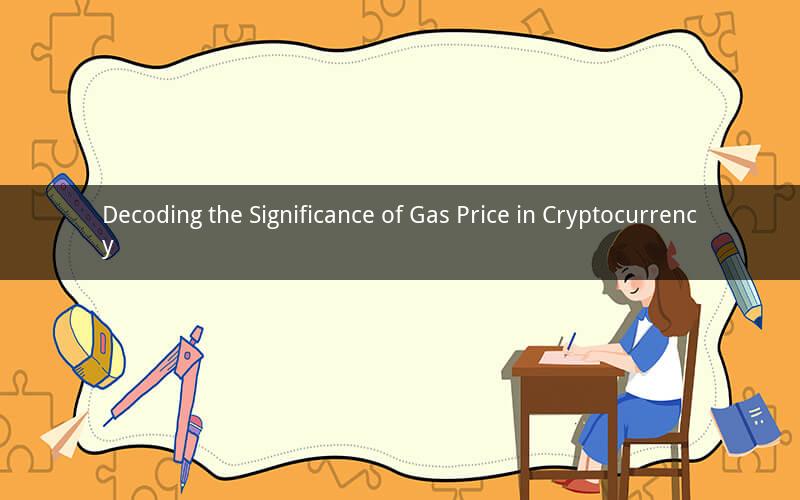
In the rapidly evolving world of cryptocurrency, the term "gas price" has become a pivotal factor for many users. But what does gas price mean in cryptocurrency? This article aims to unravel the mysteries surrounding this term, exploring its implications and importance in the crypto space.
Gas Price: A Brief Overview
To understand the significance of gas price in cryptocurrency, it's essential to first grasp the concept of gas itself. In the context of blockchain technology, gas refers to the unit of measure used to quantify the amount of computational effort required to execute a transaction on a blockchain platform.
Each blockchain platform has its own set of rules and regulations governing how transactions are processed. In the case of Ethereum, the most popular blockchain platform, gas is used to measure the cost of executing a transaction. This cost is determined by the complexity of the transaction and the current network congestion.
The Gas Price: A Fee for Transaction Execution
The gas price is essentially a fee paid by the sender of a transaction to the network. This fee incentivizes miners to prioritize transactions with higher gas prices, ensuring that the most urgent transactions are processed first.
When a user initiates a transaction on the Ethereum network, they must specify a gas price along with the amount of gas they are willing to pay. The higher the gas price, the more likely the transaction will be included in the next block. Conversely, transactions with lower gas prices may face longer processing times or even get stuck in the network.
Factors Influencing Gas Price
Several factors can influence the gas price in cryptocurrency:
1. Network Congestion: When the network is experiencing high levels of activity, gas prices tend to rise. This is because there are more transactions competing for space in the next block, leading to increased competition for miner attention.
2. Transaction Complexity: Transactions that require more computational effort, such as smart contracts, will generally have higher gas prices. This is because they consume more network resources and require more time to process.
3. Market Dynamics: The overall demand for cryptocurrency can also impact gas prices. During bull markets, when demand is high, gas prices may rise. Conversely, during bear markets, gas prices may decrease.
The Importance of Gas Price in Cryptocurrency
Understanding the significance of gas price in cryptocurrency is crucial for several reasons:
1. Transaction Cost: Gas price directly affects the cost of executing a transaction. Users need to be aware of the potential expenses involved in sending or receiving cryptocurrency.
2. Transaction Speed: By adjusting the gas price, users can influence the speed at which their transactions are processed. Higher gas prices can lead to faster confirmation times, while lower gas prices may result in longer wait times.
3. Network Efficiency: Gas price plays a role in ensuring that the blockchain network operates efficiently. By incentivizing miners to prioritize transactions with higher gas prices, the network can maintain a balance between transaction throughput and security.
4. Smart Contract Development: For developers building decentralized applications (DApps) on blockchain platforms, understanding gas price is crucial for optimizing their applications' performance and reducing costs.
5. User Experience: A higher gas price can lead to a less user-friendly experience, as it may discourage users from engaging with DApps or participating in the network. Conversely, a lower gas price can make the network more accessible to a wider audience.
5 Questions and Answers
1. Question: Can a low gas price cause a transaction to be delayed?
Answer: Yes, a low gas price can result in a transaction being delayed, as it may not incentivize miners to prioritize it over transactions with higher gas prices.
2. Question: How does network congestion affect gas prices?
Answer: Network congestion leads to increased competition for miner attention, which can drive up gas prices as users bid higher to secure transaction inclusion in the next block.
3. Question: Are gas prices the same for all blockchain platforms?
Answer: No, gas prices vary across different blockchain platforms. Each platform has its own set of rules and regulations governing transaction execution and gas pricing.
4. Question: Can a high gas price guarantee faster transaction confirmation?
Answer: While a high gas price increases the likelihood of a transaction being confirmed quickly, it does not guarantee it. Other factors, such as network congestion and transaction complexity, can also impact confirmation times.
5. Question: How can users determine the appropriate gas price for their transactions?
Answer: Users can determine the appropriate gas price by monitoring the current network congestion and transaction complexity. They can also consult the blockchain platform's documentation or use gas price estimators to find a suitable price.
In conclusion, understanding the significance of gas price in cryptocurrency is crucial for users, developers, and miners alike. By grasping the concept of gas and its role in transaction execution, individuals can make informed decisions regarding their interactions with the blockchain network.